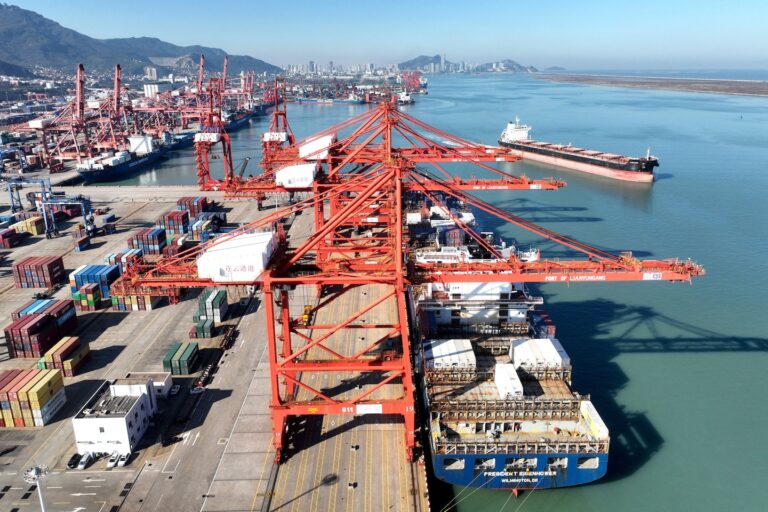The moves come just days before Chinese President Xi Jinping is due to convene a high-level meeting of Communist party officials where his “shared prosperity” agenda will be a top priority and officials are expected to lay out a reform package aimed at restoring confidence in the struggling economy.
Authorities are scrambling to contain the fallout from the revelations, with the Chinese government ordering investigations by multiple departments this week and launching on-site investigations in Hebei province and the city of Tianjin, as similar reports emerge across the country.
Get caught up in
Stories to keep you up to date
The outrage began after the state-run Beijing News reported last week that China’s largest state-owned grain company, Sinograin, had been transporting edible oil in trucks that are also used for coal-derived fuel without washing the vehicles between trips.
An in-depth investigation based on following tankers and interviewing drivers over several weeks found that mixed truck use is an “open secret” in the industry and a way for freight companies to cut costs.
According to the article, third-party transporters are the main culprits, but major edible oil manufacturers: Legally binding regulations prohibiting this behavior.
Panic erupted among shoppers trying to make sure the oil they use every day to stir fry at home is safe. — Most commonly soybean oil — It was free from carcinogens, heavy metals, and other toxic substances.
Zeng Qiuwen, chairman of the Guangzhou Food Industry Association, said in an interview that the incident has made it difficult to avoid the use of oil or strictly test its quality, leaving consumers feeling helpless.
Chinese consumers have no choice but to buy the oil unless they go back to the old-fashioned way of making their own oil from fatty meat, he said.
Food safety and counterfeit drug scandals have plagued China since the early 2000s, when unbridled economic growth and the pursuit of business opportunities often involved cutting corners and lax regulatory oversight.
In 2008, a major baby formula manufacturer was found to have been adding melamine, a chemical known to cause kidney stones, to its formula. The tainted powdered milk was used to artificially increase its protein content, and an investigation found that six children died and 300,000 became ill after drinking it.
Cooking oil has become a particular concern since the early 2010s, when it was discovered that dozens of restaurants and street vendors were scooping up used oil scraps from trash and gutters, processing them and reusing them in cooking to save money.
As China’s economy has lost steam over the past decade, President Xi Jinping has shifted away from encouraging growth at all costs, saying it is equally important to reassure the Chinese people about foreign threats and domestic misconduct.
China’s cabinet, the State Council, launched an interdepartmental investigation into edible oil shipments on Tuesday in an apparent effort to prevent the scandal from worsening, and promised “severe punishment” for any wrongdoing.
Official propaganda portrayed them as on the side of the people and published scathing criticisms of the alleged wrongdoings and urged the companies to do better. State broadcaster CCTV said that if confirmed by an official investigation, the actions would be “tantamount to poisoning”.
Official condemnations failed to quell the protests. Online, people questioned why there were no rules requiring industrial and consumer goods to be transported in separate containers. Some announced plans to buy imported oil or produce their own oil from scratch.
As other news organizations and Internet sleuths began investigating the tanker industry, a flood of reports poured in from around the country.
Journalists used a paid cargo-tracking service to follow trucks traveling between industrial customers and edible oil manufacturers, and reported suspicious patterns to local authorities.
The State Council’s investigation will be thorough, but a high level of pressure on the industry needs to be generalized, otherwise the practice “will surface again sooner or later,” said Zeng, chairman of the Guangzhou Food Industry Association.
China has previously reported similar incidents of contaminated tankers: in 2005, reporters found evidence that molasses was being transported in tanks used to carry diesel fuel, but the tanks had not been cleaned.
But Zhu Yi of China Agricultural University wrote in Hong Kong website Phoenix Media that “it seems people have not learned lessons from past incidents.”
Testing alone is ineffective, Chu said: One reason contamination is hard to detect is that residual hydrocarbons from fuel are often left in such small amounts that they can’t be detected by cooking oil tests.
The Beijing News found loopholes and a general lack of awareness and supervision throughout the entire process of transporting bulk edible oil, meaning there were all kinds of contamination risks, and the solution should be “prevention, not detection,” Zhu wrote.
Another problem is that the competitive trucking industry is struggling to make profits in the sluggish economy. Cleaning a tank can take four to five hours and cost as much as $55, according to financial publication Caixin.
As outrage grew following the revelations this week, censors stepped in to quell debate by removing some articles on the topic and blocking related tags on social media, with online commentators defending the importance of public scrutiny and investigative journalism in uncovering health and safety failures overlooked by authorities.
Despite being state-run, the Beijing News is known for its in-depth reporting on social issues, and its reporters regularly push the boundaries of censorship to expose wrongdoing in state-owned enterprises and local governments.
The original article remains online for now, but follow-up reports by other media outlets often disappeared soon after publication.
A tracking service that journalists were using to monitor the truck went offline on Wednesday, financial news outlet Yicai reported. The article was taken offline a few hours later.
“It was the media that finally paid attention to the horrific incident with the oil tanker,” wrote one user on the social media platform Weibo. “In recent years, the media’s monitoring ability has significantly deteriorated, and more and more horrific events are happening.”

